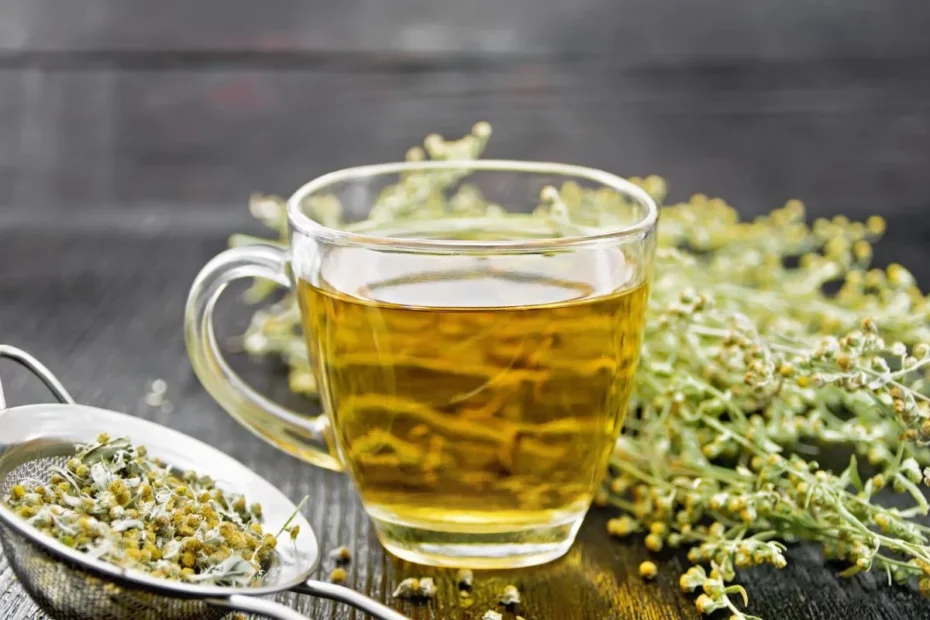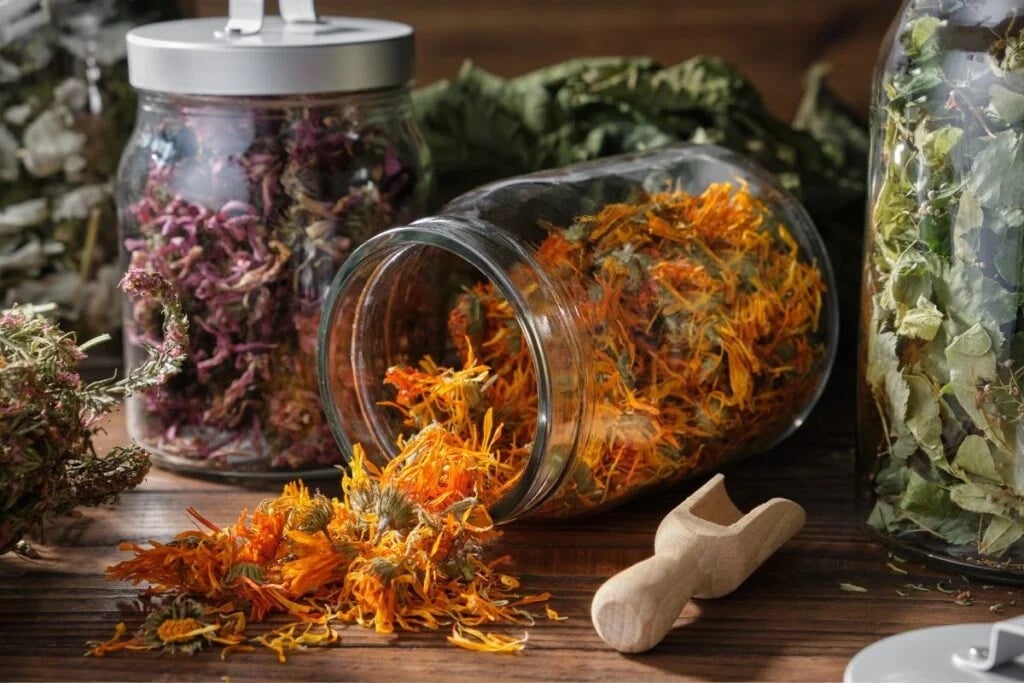Wormwood (Artemisia absinthium) – popularly known as bitter honeysuckle, bittersweet or broom – is one of the most valuable herbs for making wormwood tea. It is a perennial herbaceous plant growing up to 1 m tall. The stem is richly branched, covered with hairy leaves and woody near the ground. It produces pale yellow globular flowers in July-August and ripens into husks in September. It can grow in completely infertile soil.
It is best harvested for medicinal purposes and for teas up to 25 cm from the top just after flowering. Such herbs contain essential oils, carotene, bitter glycosides, tannic substances, organic acids, etc.
Wormwood won the Nobel Prize in 2015 for its treatment of malaria. In the past, this prize has been awarded only to the constituents of plants, but this time the whole plant – wormwood – deserved it. This plant is a miracle worker: it is not only used in teas, but also in ointments, supplements or as a spice.
Can wormwood tea cause hallucinations?
Another interesting fact about wormwood is that it is used as one of the active ingredients in absinthe (French liqueur). This drink was favoured by many 19th century artists, including the Dutch painter Vincent Van Gogh, probably because of its highly intoxicating effect.
Wormwood has also come in for much criticism for the hallucinatory effects of this drink. It was thought that it was the thujone, the active component of the plant, which was responsible for the drink’s effects. Currently, there are no specific restrictions on the use of wormwood. However, products containing wormwood are regulated in terms of the permitted thujone content. In the pharmaceutical industry, wormwood preparations are produced with thujone eliminated or at safe levels.
Due to this property of wormwood, it is preferable to use dried raw wormwood (lower in thujone) in folk medicine and only very responsibly.
Wormwood tea in folk medicine
Although wormwood is very bitter, it is quite popular in folk medicine and is used to treat the following diseases:
- in digestive disorders,
- oncological diseases,
- against worms, parasites, yeasts, fungi and mucus,
- diseases of the gall bladder,
- diseases of the liver,
- to improve appetite,
- cleansing, and weight management.
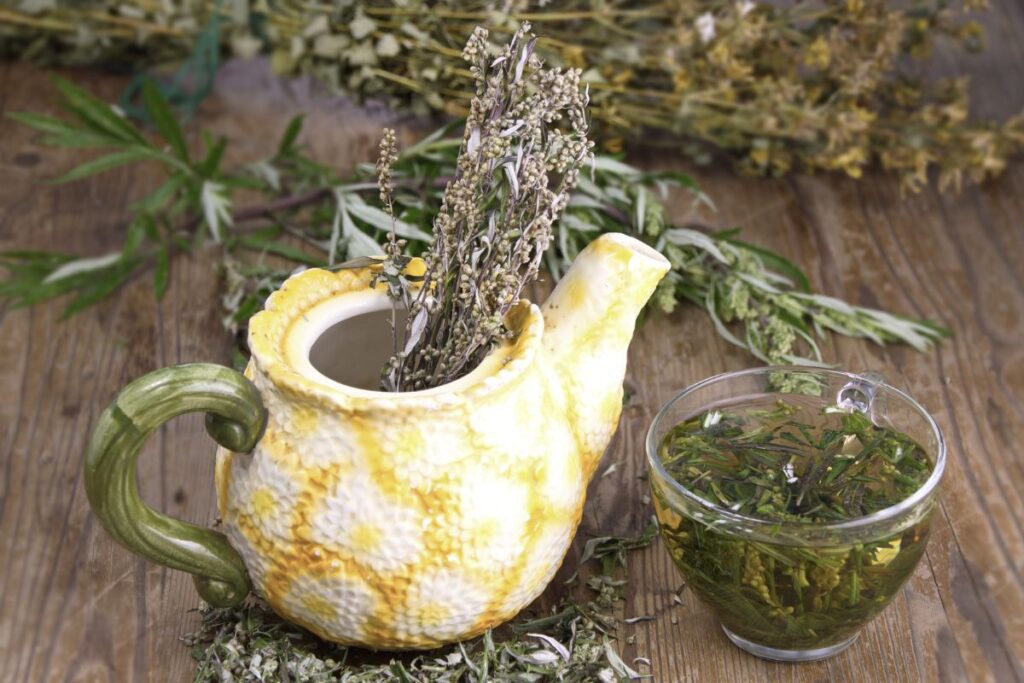
The rich composition of wormwood is beneficial to health
Wormwood is extremely rich in its composition and works wonders for the substances it contains:
Bitterness – this is what makes wormwood taste bitter – it stimulates the body’s digestive system, cleanses parasites and kills bacteria.
Artemisinin – acts against cancer cells, kills and helps to eliminate parasites.
Flovanoids – the yellow pigment in wormwood flowers – protect the body against a wide range of inflammations, strengthen the walls of blood vessels and connective tissues, and inhibit allergic reactions.
Apple acids protect red blood cells from the effects of harmful chemicals, improve blood circulation, digestion and balance metabolism.
Succinic acid stimulates cell renewal, thus slowing down the ageing process and providing more energy.
Caratinoids protect the body’s cells from damaging free radicals, support immunity and reduce the risk of cancer.
Capillin kills fungi, reduces pain and the risk of blood clots, acts as a natural antibiotic and improves the absorption of vitamins A, B and C.
Carotene, like caratinoids, acts as an antioxidant and has a positive effect on skin elasticity.
Chamazulene inhibits inflammation.
Potassium ensures fluid balance in the body, muscle and cardiac function, and supports a healthy nervous system.
Calcium is important for teeth, bones, the nervous system and the acid-base balance of the body.
Vitamin K supports blood clotting by promoting wound healing and resistance to infection, reduces the risk of osteoporosis, maintains bone strength and normal kidney function.
Vitamin C is a key immune-boosting vitamin, helps with iron absorption and is involved in collagen production.
Vitamin B is involved in the metabolism of fats, amino acids, proteins, red blood cells and hormones, and is needed for normal nervous system function and immunity. Vitamin B6 is one of the most important vitamins in the female body for maintaining normal hormone balance.
How to make wormwood tea
Although wormwood can be used in a variety of ways (fresh, in capsules, as an essential oil), it is best to make tea from dried raw material. It contains less of the chemical compound thujone, which can adversely affect the mental system.
- Add half a teaspoon of dried wormwood to a cup.
- Cover with boiling water (250 ml) and allow to infuse and cool for about 15 minutes.
- As the tea is bitter, you can enhance the taste with lemon and honey.
Wormwood tea should be drunk unsweetened for the best effect. However, wormwood tea is bitter. To soften this unpleasant taste, you can add dried peppermint or aniseed to the tea. Alternatively, add a slice of lemon or sweeten it slightly with honey.
If you are healthy and do not have any chronic illnesses, drinking 1 cup of wormwood tea for 7 consecutive days is sufficient as a preventive measure. Even after 3 days you can feel the positive result.
In case of any ailment or illness (especially gastrointestinal problems), drink 50 grams of wormwood tea several times a day, 30 minutes to 1 hour before meals or 1-2 hours after meals.
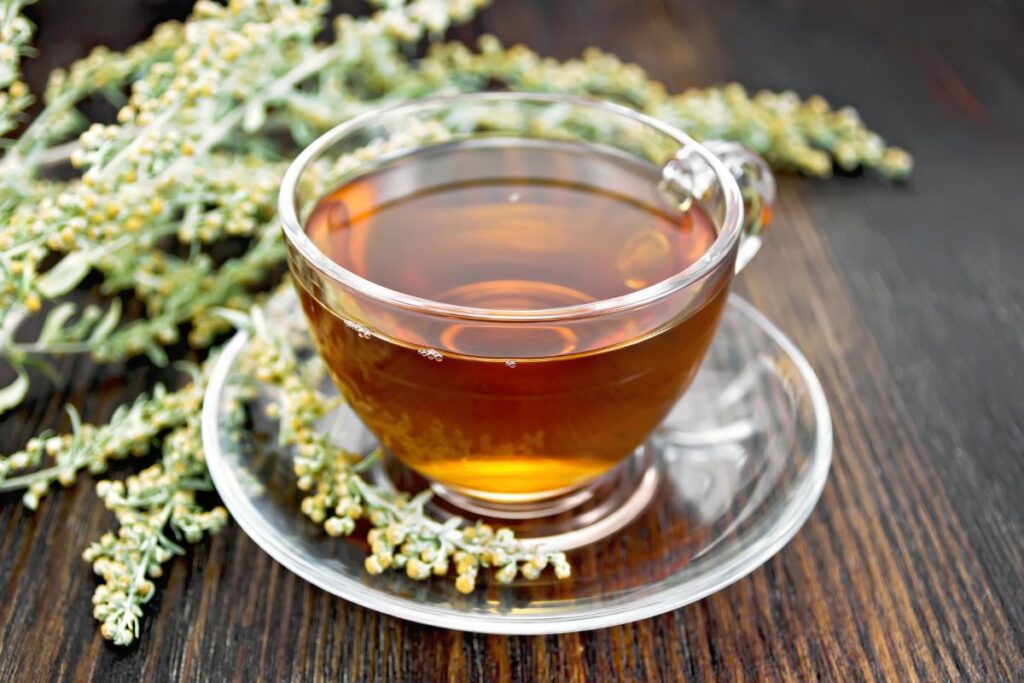
Tincture of wormwood to improve appetite
To prepare the tincture you will need:
- 1 cup of dried wormwood herb,
- 250 gr of vodka.
Pour the wormwood raw material into a sealed container with vodka, close tightly and store in a cool, dry place for 4-6 weeks. Then strain the infusion and pour it into a clean, sealed bottle. Take 20-30 drops of the tincture daily for up to 2 weeks. To improve appetite, use the tincture 30 minutes before meals. For those with digestive problems, the tincture is taken after meals twice a day. The tincture can also be used as a tea substitute by adding 15 drops to a glass of water, stirring and drinking.
Listen to your intuition
For those who like to drink a tea every day, you can try to listen to your intuition and feel that maybe today you would like a weaker wormwood tea, or maybe you would like to mix it with other herbs such as thyme, calendula, clove or yarrow. Listen – your body really does have the ability to sense which substances it needs most today.
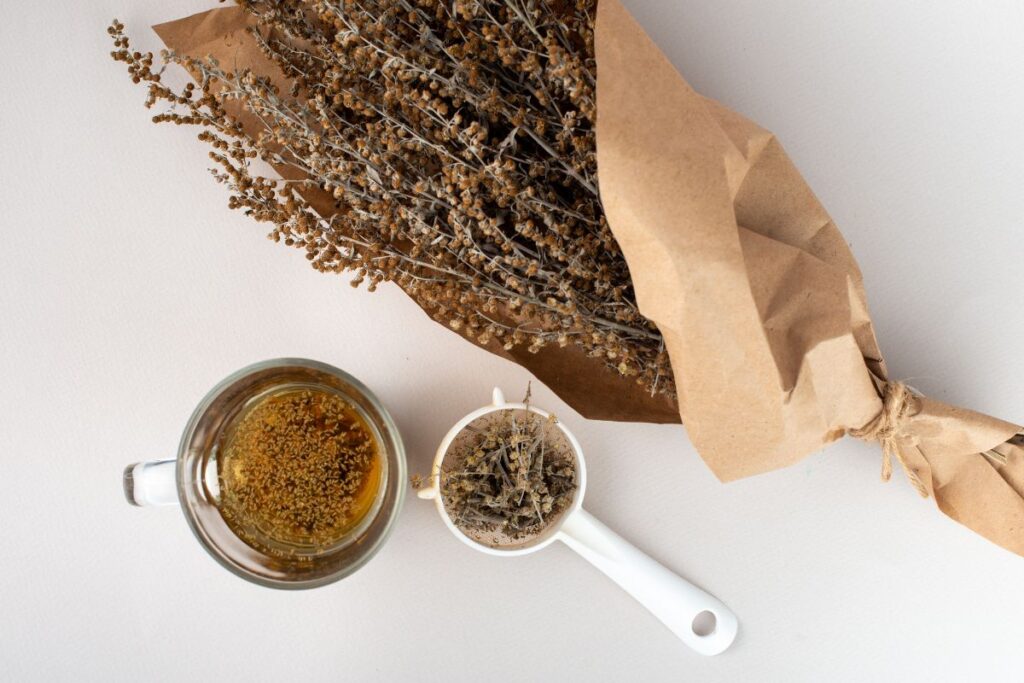
Wormwood tea for children
You can occasionally give weak wormwood tea to children. Don’t be afraid – sometimes children even like the bitter taste and ask for it again the next day, which means that the child’s body is currently deficient in some of the substances that wormwood contains.
If you suspect your child of having worms and he/she does not want to drink bitter wormwood tea, you can flavour it with honey or just sprinkle wormwood powder on bread spread with honey.
A mixture of wormwood, bittersweet and cloves for parasites
This mixture is recommended to cleanse the body of parasites.
Mix equal parts of wormwood, cloves and bittersweet crushed herbs (powder). Take 1 teaspoon daily with honey and warm water. After 3 weeks of use, take a month’s break.
Wormwood for home air purification
Wormwood, as a natural antiseptic and germ fighter, can be used to purify indoor air and improve its quality. You can make it at home to ensure a fresh indoor smell as well as cleanliness.
You will need:
- 1 teaspoon of dried wormwood or 2 teaspoons of fresh wormwood,
- 1 teaspoon of thyme herb,
- a sprig of rosemary,
- a few sprigs of lavender,
- 2-3 cloves,
- ½ litre of apple cider vinegar.
Mix all the ingredients together, put them in a sealed jar and leave them in a cool, dark place for 3-4 weeks. Then strain the mixture and pour it into a spray bottle. Spray this mixture every morning in your home or office and breathe clean, fresh air!
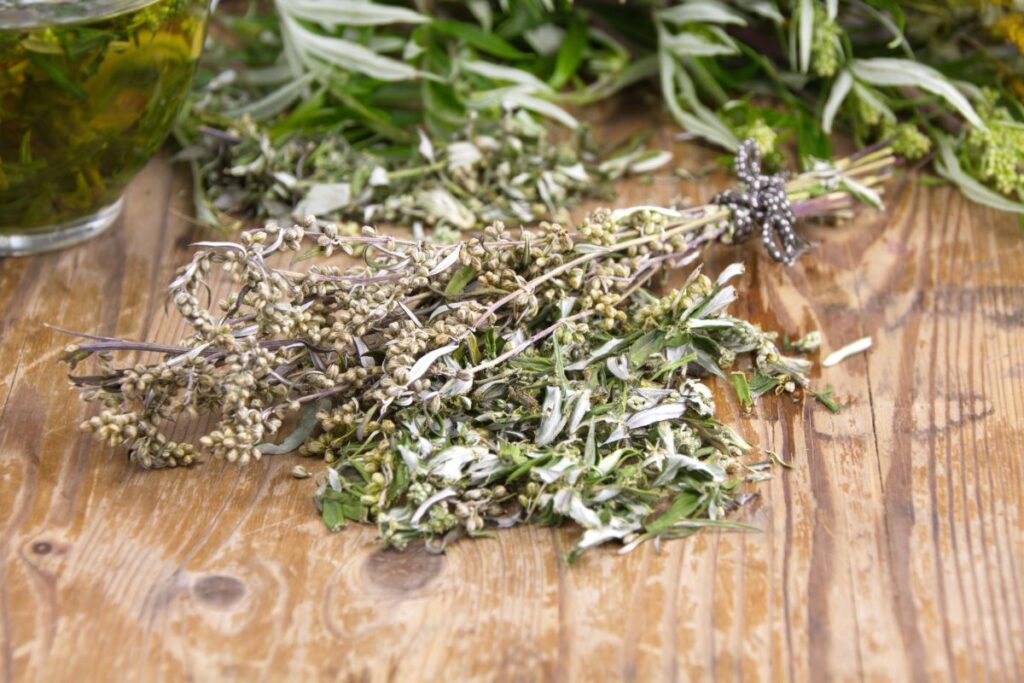
Wormwood tea side effects
Even if you have just read about the benefits of wormwood for your body, it should be used responsibly. High doses of wormwood can cause nausea, vomiting, digestive or kidney problems, even seizures, so this miracle herb should be used with caution and responsibility. Wormwood should be avoided if you:
- You are allergic to many herbs or pollens, have hay fever.
- If you are pregnant, you should not use wormwood as it can cause miscarriage.
- If you are breastfeeding, you should avoid taking wormwood as there is insufficient data on its effects on babies and young children.
- You have epilepsy because the thujone in wormwood stimulates the brain and can cause seizures. Wormwood can also reduce the effectiveness of common anticonvulsant drugs such as gabapentin and primidone.
- If you have a heart condition, taking wormwood together with the heart medicine warfarin can cause intestinal bleeding.
- You have kidney problems because wormwood is toxic to the kidneys and may increase the risk of kidney failure.
Sources:
https://www.healthline.com/nutrition/what-is-wormwood#forms
https://draxe.com/nutrition/wormwood/
https://www.medicalnewstoday.com/articles/wormwood
https://www.healthyhildegard.com/wormwood-benefits/
https://en.wikipedia.org/wiki/Artemisia_absinthium
Associative photos from © Canva.
